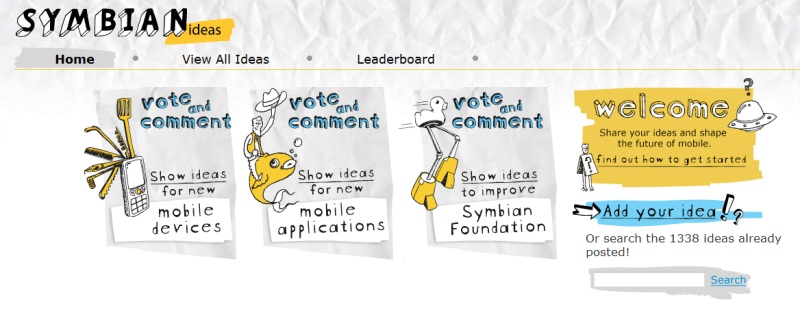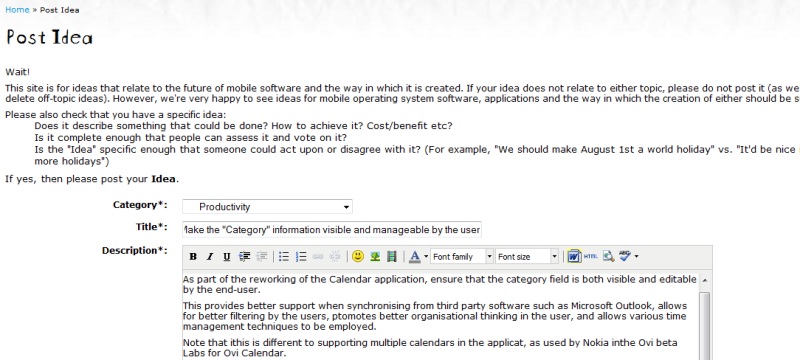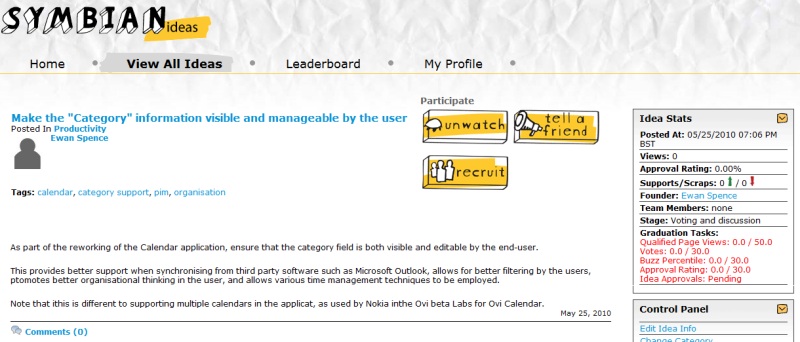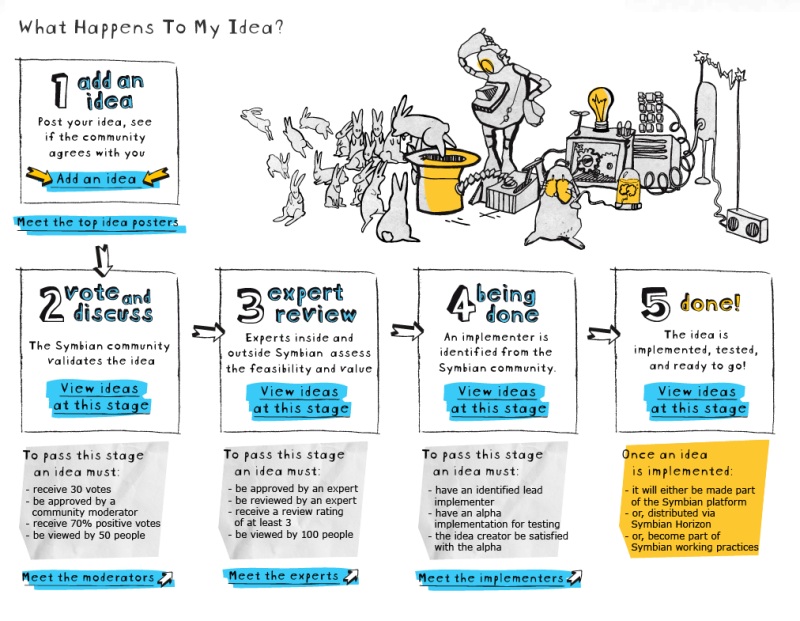Following on from my thoughts last week on what to do with Personal Information Management (PIM) software in Symbian, it's time to have a look at what can be done about it. It's all very well shouting about a problem, but shouting about a problem and providing a potential solution is far more constructive.
A quick look around the software scene for Symbian shows a few third party choices (such as HandyCalendar or AquaCalendar) that provide a number of the features discussed, and some of their own. They also talk to the existing Calendar database in the devices, so you aren't left with the question of what happens to your data when you start using them (or stop using them!)
But let's say that this isn't enough for you, and you need something that follows your design to the letter. Well, in theory, you can pick up the SDKs for Symbian OS and start coding yourself, but unless you have existing experience in programming that's an incredibly tough route to follow; given we're looking at a talking to low levels of the operating system, built in databases, network protocols, synchronisation and a huge UI challenge.
So how about the second option – ask someone to develop it or you. Well, if you thought paying £30 for an application in the Ovi Store was a bit steep, then you might want to avoid this option. Hiring a team to develop an application is not a cheap option, and you'll need to be deeply involved in the process, through the initial design to answering every question on the interface, the UI, what each button does... it's not something that's achievable by a regular user.
The third way though, that's the interesting one.

While it's not always going to work, it's a way to directly inflluence the development of Symbian OS itself. Simply put, you contribute your ideas directly to the Symbian Foundation. During last year's Symbian Exchange and Exposium, there was a large empty wall, a pile of post-it notes, and an invitation for people to write up a good idea for the next versions of the Symbian OS. The wall is obviously no longer at Earl's Court, but a virtual version is still available at ideas.symbian.org.
This is their starting point for users to get involved with the future direction of the platform, and if you have ideas (such as, I don't know, reworking the Calendar application!) then here's where you can put in your ideas, rally support and generally do something about it.
Of course this isn't a free for all on the main code line, there is some structure in place. While anyone can add an idea, it takes a bit of momentum for it to be labelled essentially as a good idea so that it can move to the next stage. This is the “Voting and Discussion" stage; and by virtue of the Ideas Board being something of a social network (albeit one with a smaller population than Facebook, but no less engaged with the topics), it falls to the community to mark up and evaluate ideas.

As ideas come in, anyone can read them, and if they like them, show their support by voting for them. Gather enough attention at this stage (50 people viewing the idea), and enough votes (30 votes, with at least 60% of them being positive) and your idea can advance to the next level – assuming one of the community moderators approves it.
Now it's had the initial clearance to proceed, it starts to get a bit more competitive. This is now the third stage, “Expert Review,” and is the first time that you need not only community support, but that of a Symbian Expert. These could be internal members of staff, or external members of the community who have been granted that right by the Symbian team. Find one of these experts to champion your idea, and you'll be on your way. The community is still needed though, as you need the attention of over 100 people and a review rating of at least 3.

One idea currently which has passed this level, and is now at the “Being Done” fourth stage is Peter Harper's idea to give the Alarm application the ability to start the FM Radio or a pre-selected MP3 track. He's got the views and support of the community, the nod from an expert, and now needs an implementer – someone to actually lead the developer effort and have it ready to plug into the Symbian ecosystem.
Of course it's not as easy as that – in Harper's case, Symbian are working behind the scenes on the idea, negotiating with partners to see if they would work on this, as noted in the comments to the idea: “Peter, please can you contact me at freddieg(at)symbian.org. We're working with the package owners to try and make this idea into reality, and it would be great to have you involved and giving feedback as your idea is implemented.”

But what's important is that the process is in place, and it's a transparent process for all to see. While there may not be many ideas that have been taken all the way to the completed level (currently there are twelve ideas), when people ask about how open an Operating System Symbian actually is, the Ideas section of the website is one of the definitive answers.
So now we have this section, has it been used for any changes in the Calendar application?
Right now there are 161 different ideas to do with “Calendar” on the Ideas section – some of them are small UI tweaks which aren't gathering a huge amount of support, partly due to a lack of definition in the idea – Robert Silver suggests “a system which will coordinate all the calendars in my life“ - which is very high level, and needs more detail added. Vincent Mariani has a similar idea (to have the Symbian Calendar manage a number of calendar subscriptions and synchronisations), which gives more flesh to what he imagines.
No massive Calendar changes have passed through the system yet – you need to head back to the third stage of ideas (Expert Review) to find ideas and discussions around the Calendar application, which are looking to gather support and detail to be taken forward.
In Summary
With your blank sheet of paper and a bundle of ideas, you can certainly plan out either a new application or changes to the Symbian OS software stack, be it at low level or higher up the application chain. But unlike other mobile operating systems, the Symbian Foundation has provided a route for the active user in the ecosystem to contribute to the growth and direction of the platform.
Whether there will be a single tangible Ideas instance that people can point to, rather than lots of small tweaks that get rolled into a larger update that's not so easy to mention in a press release, the Ideas portal on the Symbian website is another example of the community spirit that can be brought to an Open Source project that needs to work in the critical environment of the smartphone. It might be small, but it's already having a positive effect on the community, which can only be a good thing.
-- Ewan Spence, May 2010.
